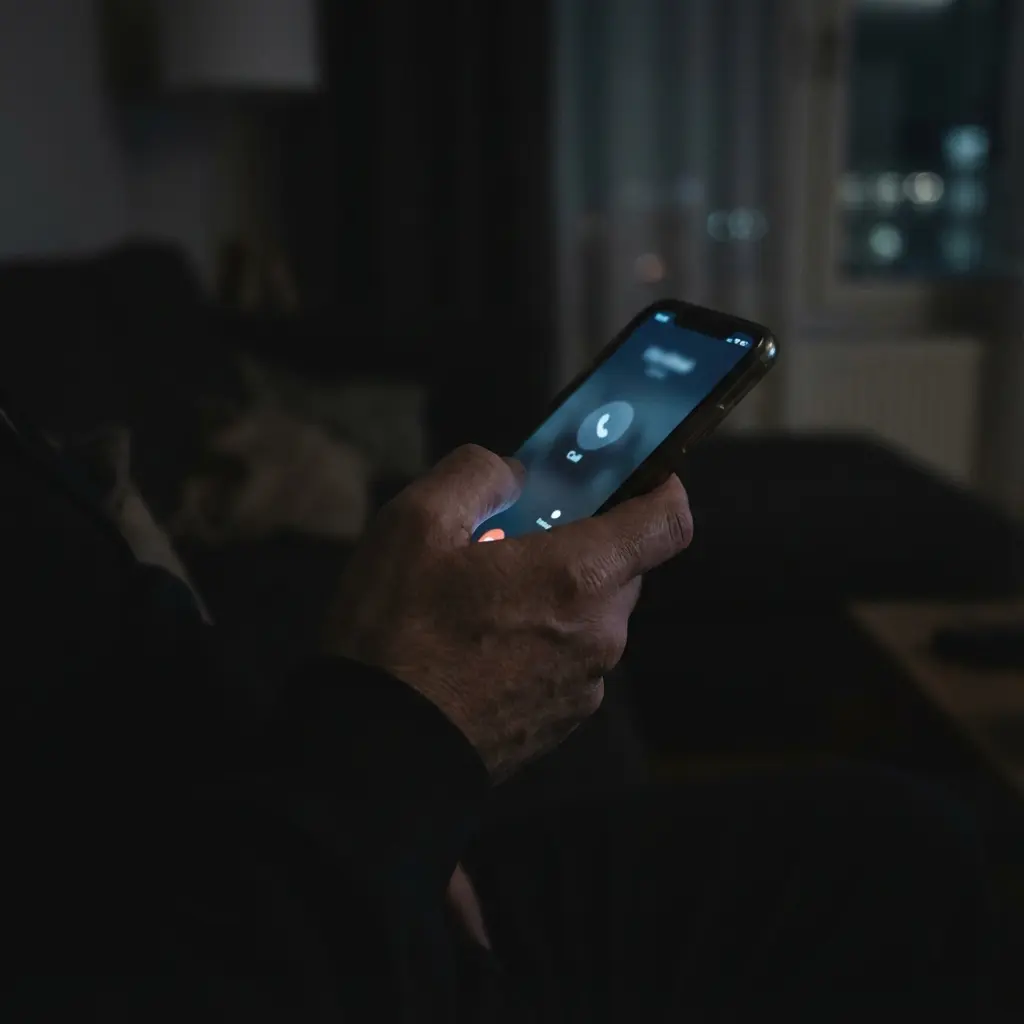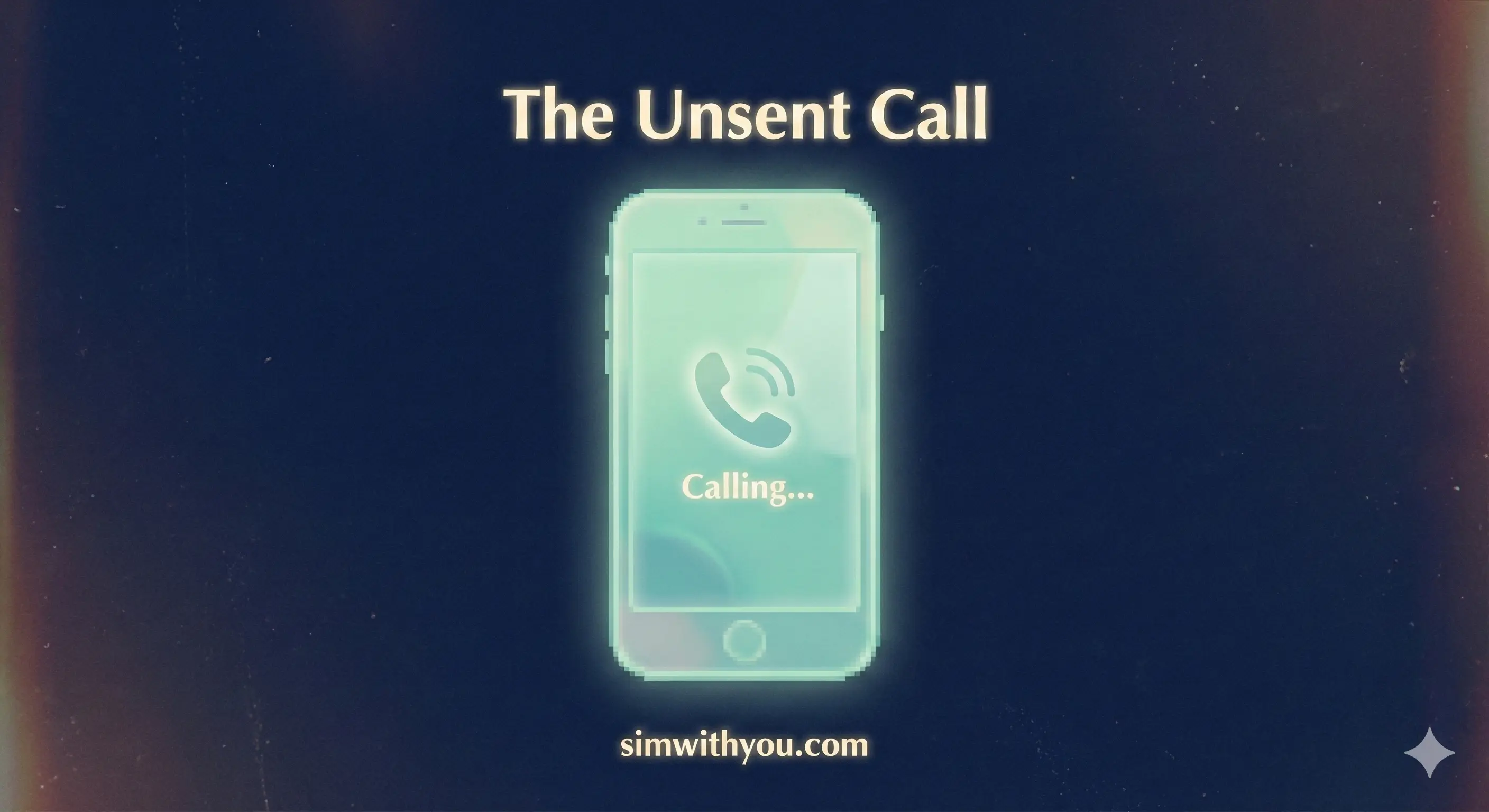It's 2:47 AM. The room is absolutely still—no cars outside, no footsteps in the hallway, no hum from the refrigerator. Just the kind of quiet that makes your thoughts echo. The only light comes from your phone screen, casting a pale blue glow across your face, turning your bedroom into a small island of wakefulness in an ocean of sleep.
You're scrolling through your contacts list. The names blur past in alphabetical order—Alex, Chris, Jordan, Morgan—familiar names attached to living, breathing people you could call right now if you wanted. But you're not looking for just anyone. Your thumb slows down. Then stops.
There it is. That one specific entry.
Your finger hovers over the name, suspended in the space between wanting and doing. It's just a collection of pixels—ten digits and a label stored on a silicon chip smaller than your thumbnail. But it feels heavier than anything else in the room. Heavier than the blanket on your lap. Heavier than the quiet. It has gravity. It pulls you in, the way the edge of a cliff pulls your eyes downward even when you know you shouldn't look.
This is the ghost in your machine. The contact you can neither call nor delete. The name that appears when you search for something else. The number you've scrolled past a thousand times, each time pretending you didn't see it, each time seeing nothing else.
The Archive of Unfinished Business
We all have digital archives of people who used to be our world. Names that once appeared in our notifications twenty times a day. Numbers we could dial in the dark, muscle memory guiding each tap on the screen. People whose birthdays our phones still remember, even though we don't celebrate together anymore.
- The ex-partner whose number is still memorized in your fingers—you could type it without looking, even now, even after all this time.
- The old friend you drifted away from without a fight, without drama, without any particular reason. Just... silence, stretching out month after month until reaching out felt more awkward than staying quiet.
- The family member who is no longer with us, whose voicemail greeting you saved before the phone company reclaimed the number.
- The mentor who believed in you once, before you stopped showing up to prove them right.
Why do we keep these numbers? We tell ourselves elaborate stories. "Just in case of an emergency." "Just in case they call first and I need to know who it is." "Just in case I need to reach their family someday." But the truth is often simpler and sadder: deleting the number feels like deleting the history. Like admitting it's really over. Like burning the last bridge, even if you haven't crossed it in years.
The Digital Cord
As long as the number is there, a thin, invisible line still connects you. It's a dormant link, a potential path, a door you've closed but not locked. You could open it anytime—theoretically. In practice, you never do. But the theoretical possibility feels important, even sacred. Pressing "delete" feels like snipping that last thread with your own hands, like signing the final paperwork, like saying out loud "this is over and I accept it." It makes the ending final. And finality is terrifying in a way that prolonged ambiguity somehow isn't.
The Drafts We Never Send
How many times have you typed out a message to them? Not just thought about it—actually opened the messaging app, pulled up their conversation thread (still there, preserved like a museum exhibit), and started typing.
"I saw that movie we talked about. You were right, the ending was perfect."
"I'm sorry about what I said. I've been thinking about it for months."
"I miss you. That's all. Just wanted you to know."
"Are you okay? I heard about what happened."
You type it. All of it. Sometimes you edit it three times, trying to get the tone right—not too desperate, not too casual, not too formal. You stare at the cursor blinking at the end of your carefully crafted message. Blink. Blink. Blink. It's a heartbeat. It's a countdown. It's a dare.

Then doubt creeps in. What if they don't respond? What if they do respond, but it's cold, perfunctory, obligatory? What if you're bothering them? What if they've moved on and you're the only one still standing in the ruins of whatever this was?
So you hold down the backspace key. You watch the words disappear one by one, letter by letter, swallowed back into the void. The cursor blinks on an empty text field. Like nothing ever happened. Like you never said anything at all.
Except you did say it. These "phantom drafts" take up space in our minds. They are conversations that are happening in parallel universes where we were brave enough to hit send. Where we risked the rejection. Where we chose truth over safety. In this universe, they remain silence. But the silence is loud.
Closure Without Contact
We often think closure is something two people give each other. A mutual agreement. A final conversation where everything gets said and everyone walks away understanding. "We need to talk to get closure," we say, as if closure is a document that requires two signatures.
But what if that talk never happens? What if they won't answer? What if they blocked your number? What if they moved to a different city, a different life, a different version of themselves that doesn't include you? What if they can't answer—because they're gone, truly gone, in the permanent way?
Waiting for someone else to give you peace is a recipe for endless unrest. You're handing them power they don't even know they have, waiting for permission they'll never grant, hoping for an apology that may never come or an explanation that may never make sense.
Sometimes, you have to manufacture your own ending. You have to write the final chapter yourself, even if the other character never reads it. You have to say the words, even if no one is there to hear them. Because the words aren't for them anymore. They're for you.
Try This: The 30-Second Voicemail
You don't need to make the call to say the words. You don't need their permission to speak your truth. Try this private experiment—it's surprisingly powerful:
- Find a quiet moment. Late at night works well. Or early morning when the world is still asleep.
- Open the Voice Memos app on your phone. (Or any recording app you have.)
- Hit record. Pretend they picked up. Imagine you hear their voice saying "Hello?"
- Speak for 30 seconds. Don't rehearse. Don't plan it. Just say what's been stuck in your throat for weeks, months, years. "I'm still angry at you." "I forgive you, finally." "I miss the person you used to be." "Goodbye." Whatever needs to come out.
- Stop recording. Take a breath. Notice how you feel.
- Then—and this is the crucial part—delete the recording immediately. Don't listen to it. Don't save it. Don't send it. Just let it go.
You said it. The energy is out of your body, released into the air, no longer trapped inside your chest. It doesn't need to be heard by anyone else to be real. It doesn't need to be preserved to matter. You spoke. That's enough.
The Beauty of the Void
There is a strange comfort in speaking to the void. The void doesn't interrupt you mid-sentence. It doesn't argue with your version of events. It doesn't tell you that you're being dramatic or that you should be over it by now. It doesn't reject you or leave you on read for three days before sending a thumbs-up emoji.
The void simply accepts whatever you throw into it—your grief, your rage, your love, your regret, your longing, all the messy, complicated, contradictory feelings that don't fit into a neat text message. It holds it all without judgment, without expectation, without demanding you make sense or be fair or get to the point.
Maybe that's why we look at the stars when we're heartbroken. Or stand at the edge of the ocean and shout into the wind. Or stare at a dark phone screen at 2:47 AM, talking to someone who isn't there. We are looking for a place big enough to hold our unsaid words. A container vast enough for all the things we never got to say, all the conversations that ended too soon, all the explanations we deserved but never received.
The void is that place. And sometimes, that's exactly what we need.
📞 Make the Call to Nowhere
I created a safe space for exactly this moment. It's called The Unsent Call. You can dial the number you've been staring at. The phone will ring—you'll hear it, that familiar sound that used to make your heart jump. You can speak everything you've been rehearsing in your head at 2:47 AM. But no one will answer. No one will hurt you or disappoint you or leave you on read. It's closure, on your terms. A conversation with the void that feels remarkably like the real thing.
Open The Unsent CallClosing Thoughts
You don't have to delete the number today. You don't have to forget them tomorrow. You don't have to "move on" according to anyone else's timeline or definition of what that means.
The contact can stay in your phone as long as you need it there. The history can remain preserved. The door can stay unlocked. That's okay. That's allowed.
But you also don't have to carry the weight of these unspoken words forever, holding them in your chest like stones, growing heavier every day. There are ways to lay them down without making the call. You can whisper them to the rain on a dark night. You can type them into a simulation that will hold them gently. You can speak them to an empty room at 2:47 AM. You can record them and delete them thirty seconds later.
The message doesn't need to be delivered to be sent. The words don't need to reach their intended recipient to fulfill their purpose. Once they leave your body—spoken, typed, whispered, released—you are lighter. Once it leaves you, you are free.
The number will still be there in your contacts. The name will still appear when you scroll past. But maybe, just maybe, it will feel a little less heavy. A little less like gravity. A little more like what it actually is: just pixels on a screen.
